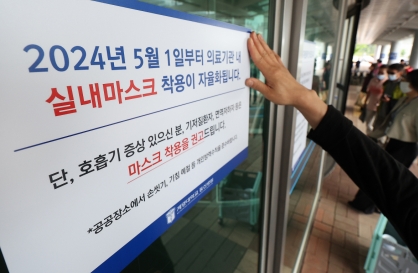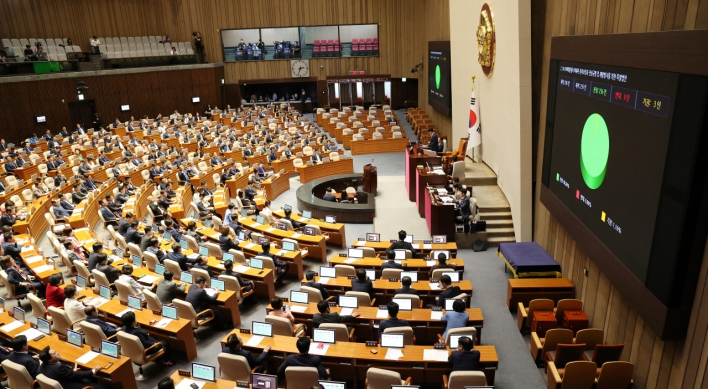New global Korea: From brain drain to brain circulation
By Korea HeraldPublished : Aug. 28, 2012 - 20:45
Dr. Sherikulova Minara, an associate professor of the Department of Korean Studies at Bishkek Humanities University in Kyrgyzstan, finished her master’s and doctorate courses in linguistics as a Korean government scholarship student from 1997 to 2005. After returning to her home country, she became a professor for the newly established Department of Korean Studies, contributing to promoting Korean studies as one of the most popular majors at the university.
During her visit to Korea again in August this year through the Korean Government Scholarship Alumni Program, she said: “I would be delighted to play a role in bridging Korea and Kyrgyzstan so that they can be each other’s brother country.”
Professor Minara illustrates the very case that the exchange of talented people can lay a key foundation to connect Korea and the global society in terms of cultural and academic exchange. Korea has been pushing for a project to attract and foster global talent like Sherikulova so that they can facilitate the exchange between Korea and their home countries and further enhance Korea’s competitiveness.
To this end, the Korean government has taken various initiatives to globalize education sector in Korea: unification of all sorts of government scholarship programs under the name of “Global Korea Scholarship,” extension of the Test of Proficiency in Korean, and the launch of “CAMPUS Asia,” short for Collective Action for Mobility Program of Students in Asia program, which is an East Asian version of the Erasmus Mundus program. Thanks to these efforts, the number of international students in Korea skyrocketed from 17,000 in 2004 to 89,000 in 2011.

However, looking into the details, much still remains to be done. One of the problems pointed out is universities’ relentless recruitment of foreign students during a short period of time, which resulted in the lower quality of education for and poor management of those students. Chinese students account for more than 60 percent of total international students, many of them having flown to Korea to study after getting strongly attracted to this country by Hallyu, or the Korean Wave. Unfortunately, some of the students are disappointed by the lack of appropriate management by their universities and leave Korea with anti-Korean sentiment.
Taking that into consideration, the future orientation of the government’s “study in Korea” policy for foreign students should be focused on inviting excelling students, supporting them to go back to their motherlands and bridge people in the two countries, or helping them to settle down in Korea successfully after graduation.
With an aim of achieving both quantitative expansion and qualitative management of the international students, the Ministry of Education, Science and Technology established the “Study Korea 2020 Project” to recruit foreign students to Korea strategically, to help their successful settlement in Korea, and to promote continued “pro-Korean” networking among them. The goal of this project is to bring 200,000 outstanding students to Korea by 2020.
The key to bringing global talent to this peninsula is making Korea a more attractive place to study in by enhancing the employment program for foreign students upon graduation and improving the settlement conditions. According to a survey conducted by the Korean Chamber of Commerce this year, many Korean companies are looking to hire international students but lack the information to do it. One way to address this problem is to give them access to the database of the excellent foreign talent from the “Study in Korea System,” a portal of information and administration for international students originally.
In addition, quality assurance should be improved as well. Since the introduction of the International Education Quality Assurance System in 2011 to provide systematic support and management for foreign students, the ministry evaluated the ability of 350 higher education institutions to manage international students in terms of international students’ dropout rate and number of staff in charge of administration for foreign students.
Universities with a certain level of quality assurance were provided with a warranty by the ministry. In contrast, universities with a poor international student program were restricted to visa issuance. These efforts provided an opportunity for higher education institutions to move their focus from the number of enrolled foreign students to strengthen the recruitment and management of the international students by reviewing their own capability.
Not only that, the National Institute for International Education, a state-run agency in charge of the overall management of the foreign and Korean students for studying abroad, should grow as a special agency in recruiting and managing international students, similar to Japan Student Services Organization, by extending its expertise, autonomy and size. In order to rise as a proactive organization in recruiting foreign students, the next steps for the NIIED are to set up overseas offices for prospective foreign students and to make a one-stop service system for the invitation and management of the international students.
In accordance with the OECD statistics in 2011, Korea is the third-largest exporter of students, following China and India. It is true that these Korean students, who studied abroad, have played significant roles all over the world to increase the value of the brand “Global Korea.”
However, for another leap forward, it is inevitable for Korea, as a new member of the 20-50 Club ― countries with a GDP per capita of at least $20,000 and a population of 50 million ― to create an influx of excelling talent into Korea through promoting exchanges and opening its doors to the world.
Now it’s time for Korea to establish a “new Global Korea” by “brain circulation,” not “brain drain.”
During her visit to Korea again in August this year through the Korean Government Scholarship Alumni Program, she said: “I would be delighted to play a role in bridging Korea and Kyrgyzstan so that they can be each other’s brother country.”
Professor Minara illustrates the very case that the exchange of talented people can lay a key foundation to connect Korea and the global society in terms of cultural and academic exchange. Korea has been pushing for a project to attract and foster global talent like Sherikulova so that they can facilitate the exchange between Korea and their home countries and further enhance Korea’s competitiveness.
To this end, the Korean government has taken various initiatives to globalize education sector in Korea: unification of all sorts of government scholarship programs under the name of “Global Korea Scholarship,” extension of the Test of Proficiency in Korean, and the launch of “CAMPUS Asia,” short for Collective Action for Mobility Program of Students in Asia program, which is an East Asian version of the Erasmus Mundus program. Thanks to these efforts, the number of international students in Korea skyrocketed from 17,000 in 2004 to 89,000 in 2011.

However, looking into the details, much still remains to be done. One of the problems pointed out is universities’ relentless recruitment of foreign students during a short period of time, which resulted in the lower quality of education for and poor management of those students. Chinese students account for more than 60 percent of total international students, many of them having flown to Korea to study after getting strongly attracted to this country by Hallyu, or the Korean Wave. Unfortunately, some of the students are disappointed by the lack of appropriate management by their universities and leave Korea with anti-Korean sentiment.
Taking that into consideration, the future orientation of the government’s “study in Korea” policy for foreign students should be focused on inviting excelling students, supporting them to go back to their motherlands and bridge people in the two countries, or helping them to settle down in Korea successfully after graduation.
With an aim of achieving both quantitative expansion and qualitative management of the international students, the Ministry of Education, Science and Technology established the “Study Korea 2020 Project” to recruit foreign students to Korea strategically, to help their successful settlement in Korea, and to promote continued “pro-Korean” networking among them. The goal of this project is to bring 200,000 outstanding students to Korea by 2020.
The key to bringing global talent to this peninsula is making Korea a more attractive place to study in by enhancing the employment program for foreign students upon graduation and improving the settlement conditions. According to a survey conducted by the Korean Chamber of Commerce this year, many Korean companies are looking to hire international students but lack the information to do it. One way to address this problem is to give them access to the database of the excellent foreign talent from the “Study in Korea System,” a portal of information and administration for international students originally.
In addition, quality assurance should be improved as well. Since the introduction of the International Education Quality Assurance System in 2011 to provide systematic support and management for foreign students, the ministry evaluated the ability of 350 higher education institutions to manage international students in terms of international students’ dropout rate and number of staff in charge of administration for foreign students.
Universities with a certain level of quality assurance were provided with a warranty by the ministry. In contrast, universities with a poor international student program were restricted to visa issuance. These efforts provided an opportunity for higher education institutions to move their focus from the number of enrolled foreign students to strengthen the recruitment and management of the international students by reviewing their own capability.
Not only that, the National Institute for International Education, a state-run agency in charge of the overall management of the foreign and Korean students for studying abroad, should grow as a special agency in recruiting and managing international students, similar to Japan Student Services Organization, by extending its expertise, autonomy and size. In order to rise as a proactive organization in recruiting foreign students, the next steps for the NIIED are to set up overseas offices for prospective foreign students and to make a one-stop service system for the invitation and management of the international students.
In accordance with the OECD statistics in 2011, Korea is the third-largest exporter of students, following China and India. It is true that these Korean students, who studied abroad, have played significant roles all over the world to increase the value of the brand “Global Korea.”
However, for another leap forward, it is inevitable for Korea, as a new member of the 20-50 Club ― countries with a GDP per capita of at least $20,000 and a population of 50 million ― to create an influx of excelling talent into Korea through promoting exchanges and opening its doors to the world.
Now it’s time for Korea to establish a “new Global Korea” by “brain circulation,” not “brain drain.”

By Suh You-mi
Suh You-mi is a director general of International Cooperation Bureau at the Ministry of Education, Science and Technology. ― Ed.
-
Articles by Korea Herald




![[Music in drama] Rekindle a love that slipped through your fingers](http://res.heraldm.com/phpwas/restmb_idxmake.php?idx=644&simg=/content/image/2024/05/01/20240501050484_0.jpg&u=20240501151646)

![[New faces of Assembly] Architect behind ‘audacious initiative’ believes in denuclearized North Korea](http://res.heraldm.com/phpwas/restmb_idxmake.php?idx=644&simg=/content/image/2024/05/01/20240501050627_0.jpg&u=20240502093000)


![[KH Explains] Will alternative trading platform shake up Korean stock market?](http://res.heraldm.com/phpwas/restmb_idxmake.php?idx=644&simg=/content/image/2024/05/01/20240501050557_0.jpg&u=20240501161906)









